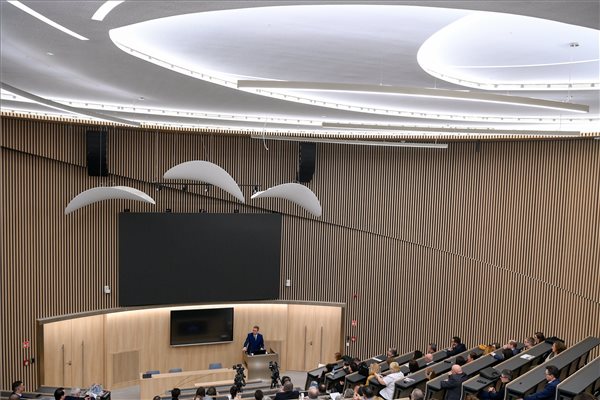The HUF 8.3 billion development, mainly for practical and professional training, has been completed at the University of Debrecen within the framework of the Széchenyi 2020 program, the project closing event was announced on Thursday.
In the coming years, the government will develop higher education with an unprecedented amount of HUF 2,700 billion, said Balázs Hankó, Deputy State Secretary for Higher Education at the Ministry of Innovation and Technology (ITM).
He added that Hungary was closest to the forefront of Europe when it had a conceptual science policy and invested in higher education.
That is why the government has launched the Klebelsberg 2.0 project, named after the renowned Minister of Culture: it will make higher education, research, development, innovation, and the whole of Hungary competitive with university investments, the Deputy Secretary of State said.
According to Balázs Hankó, the key to this is practical training, for which UD has now spent more than eight billion forints during the project. These developments will help keep the university in the international arena, he said.
The deputy secretary of state said that the number of international students participating in Hungarian higher education had increased by 65 percent compared to 2013, which already exceeds 40,000, and their spending reaches 180 billion forints a year.
Hungarian medical education is world-class and, following an international accreditation, Hungarian medical degrees are recognized all over the world, he added.
Zoltán Bács, the Chancellor of the UD, indicated that the flagship of the now completed development of more than eight billion is the multifunctional Learning Center, a three-level learning center combined with lecture and seminar rooms, which was soon built and loved by the students.
Under the project, a further 17 infrastructure investments were made, affecting almost all faculties of the university, he added.
At the event, Balázs Hankó and Dániel Molnár, President of the National Association of Doctoral Students (DOSZ), signed a cooperation agreement to strengthen the support system for young researchers.
The deputy secretary of state stressed that in the renewed higher education system, more than 80 percent of students will start their studies in a state scholarship system.
More than a hundred thousand students will receive a total scholarship of HUF 60 billion, in the case of one student the amount can reach HUF 800 thousand per year, he added.
He also said that more than ten thousand doctoral students are studying in Hungary and that they are the main source of research.
Dániel Molnár added that their association has 22 scientific departments, and the organization that performs advocacy and science organization tasks provides free legal aid services to 12,000 students.
MTI
Photo: The HUF 8.3 billion development for practical and vocational training was implemented in the higher education institution. In the coming years, the government will develop higher education with an unprecedented amount of HUF 2,700 billion. At the event, Balázs Hankó and Dániel Molnár, President of the National Association of Doctoral Students, will sign a cooperation agreement to strengthen the support system for young researchers. MTI / Zsolt Czeglédi


















